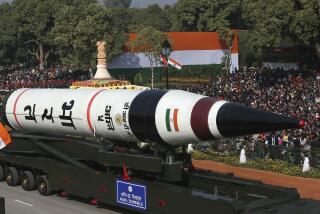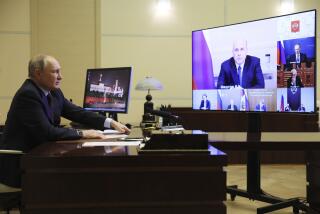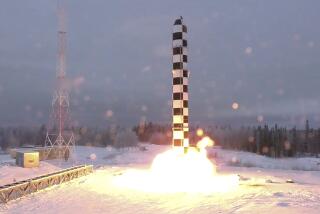Holding Out at the Expense of All
- Share via
India found itself alone in the corner at the United Nations this week on the issue of nuclear weapons testing. It deserved to be there.
The General Assembly voted 158 to 3 for a treaty to end tests of these instruments of mass destruction. Lined up with India were its neighbor, Bhutan, which has ceded control of its foreign policy to New Delhi, and Libya, an international pariah. Hardly sterling company.
Earlier this year, New Delhi’s opposition blocked adoption of the treaty at a special U.N. session in Geneva. Unless India endorses the pact, as have the 43 other nations that possess nuclear reactors, the treaty will not take effect. Nevertheless, the diplomatic weight of such overwhelming opposition to tests is seen as sufficient to deter the Indians from setting off a second nuclear explosion. In 1974 they detonated a test device.
The permanent Comprehensive Nuclear Test Ban Treaty would replace an earlier version that has been in effect for 25 years. New Delhi has argued that the pacts discriminate in favor of the five acknowledged nuclear powers--the United States, Russia, China, France and Britain--which have tested for years and now have computer models that make further underground or atmospheric testing unnecessary. India also has complained that the five nuclear powers have not set a definite timetable to get rid of all their nuclear weapons.
New Delhi has understandable concerns. Neighboring China has detonated many nuclear test weapons, and another neighbor, Pakistan, though it never has tested a nuclear device, is believed capable of assembling one quickly. India has fought one war with China and three with Pakistan.
The country’s recently formed coalition government is still shaky, but domestic opinion so far has backed the regime’s refusal to sign the treaty. However, the United Nations is expected to take at least three years in an effort to ratify the pact, giving New Delhi time to change its mind. It should.
After all, it was India that first called for a test ban treaty--in 1954. And it was Hindu scripture that J. Robert Oppenheimer quoted in 1945 after witnessing the first atomic bomb test in the New Mexico desert: “Now I am become death, the destroyer of worlds.”
More to Read
Sign up for Essential California
The most important California stories and recommendations in your inbox every morning.
You may occasionally receive promotional content from the Los Angeles Times.













